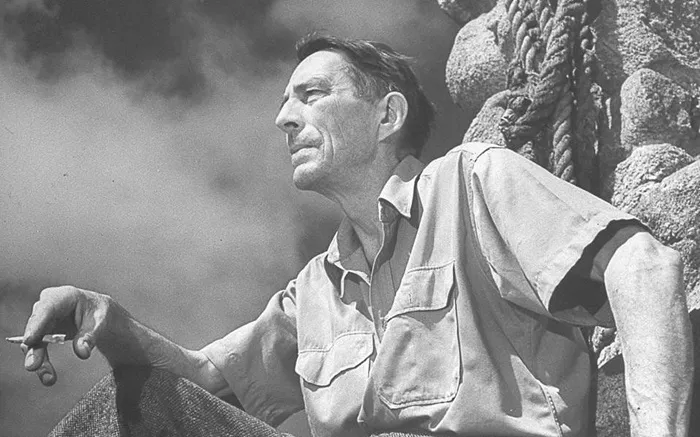The 20th century witnessed a seismic shift in the landscape of American poetry. Amidst this transformation emerged Robinson Jeffers, an American poet whose profound connection to nature, deep philosophical insights, and bold thematic explorations set him apart. A central figure in 20th-century American poetry, Jeffers built a legacy rooted in his reverence for the natural world and a worldview that both challenged and enriched the human experience.
Early Life and Foundations
Robinson Jeffers was born on January 10, 1887, in Allegheny, Pennsylvania. His early life played a critical role in shaping his poetic voice. His father, a Presbyterian minister and professor, instilled in Jeffers a love for classical literature and rigorous academic discipline. By the age of 12, Jeffers was fluent in German, French, and Latin, a linguistic prowess that would later infuse his poetry with depth and erudition.
The Jeffers family moved frequently during Robinson’s childhood, eventually settling in California. The state’s dramatic landscapes profoundly influenced the young poet, providing the rugged natural imagery that became a hallmark of his work. Jeffers attended Occidental College in Los Angeles and later pursued graduate studies in literature and philosophy at the University of Southern California, as well as medicine at the University of Zurich. However, he ultimately turned to poetry, a medium through which he could express his evolving philosophical and existential concerns.
The Carmel Years and the Birth of a Poet
Jeffers’ move to Carmel, California, in 1914 marked a turning point in his life and career. The dramatic coastline and rugged beauty of the region became both his sanctuary and muse. He and his wife, Una, settled in a stone house that Jeffers built with his own hands, calling it “Tor House.” Later, he constructed “Hawk Tower,” a solitary stone structure that symbolized his connection to nature and his philosophical outlook.
Carmel’s sweeping landscapes and crashing waves became central to Jeffers’ work. His poetry often reflected a mystical connection to the natural world, exploring themes of ecological interdependence, the transience of human life, and the enduring power of the Earth.
Philosophical Underpinnings: Inhumanism
One of the defining features of Jeffers’ poetry is his philosophy of “Inhumanism.” Rejecting the anthropocentric worldview that dominated much of 20th-century American poetry, Jeffers advocated for a broader perspective in which humanity was seen as a small, transient part of a larger, enduring cosmos.
Inhumanism posited that humans, with their self-centered concerns, were out of sync with the natural order. Instead, Jeffers believed in a return to what he considered a “proper perspective,” one that revered nature’s immensity and accepted humanity’s insignificance in the grand scheme. This perspective is evident in poems like “The Answer” and “Signpost,” where Jeffers explores humanity’s relationship with time, space, and the divine.
Major Themes in Jeffers’ Poetry
Jeffers’ work delves into a wide range of themes, often returning to the tension between humanity and the natural world.
Nature as Central and Eternal
Nature is not merely a backdrop in Jeffers’ poetry; it is a central character. His works often depict the rugged cliffs, turbulent seas, and vast skies of the California coastline, portraying them as eternal and unyielding forces. Poems like “Tamar” and “The Women at Point Sur” illustrate his belief in the indifference and majesty of the natural world.
Human Transience and Hubris
Jeffers frequently critiques human arrogance, suggesting that humanity’s obsession with progress and dominance is misguided. In “Shine, Perishing Republic,” he reflects on the fleeting nature of civilizations and the folly of human pride:
“But for my children, I would have them keep their distance from the thickening center; corruption / Never has been compulsory, when the cities lie at the monster’s feet there are left the mountains.”
Isolation and Solitude
Another recurring motif in Jeffers’ poetry is solitude, both physical and existential. Living in Tor House and Hawk Tower symbolized his retreat from modern society, allowing him to focus on the eternal rhythms of nature. His poetry often explores the tension between isolation as a source of insight and the alienation it brings.
Influence and Reception
Robinson Jeffers was a polarizing figure in 20th-century American poetry. Critics admired his technical mastery and his ability to weave narrative and lyrical elements seamlessly. His long poems, such as “Tamar” and “Roan Stallion,” showcased his epic storytelling ability, while shorter works like “Hurt Hawks” demonstrated his skill at poignant and compact expressions of his worldview.
However, Jeffers’ rejection of human-centered concerns and his bleak view of civilization alienated some readers. During the mid-20th century, as modernist poets like T.S. Eliot and Ezra Pound dominated American poetry, Jeffers’ work was often seen as out of step with prevailing literary trends. Nonetheless, his focus on ecological themes and his critique of human hubris have earned him renewed attention in the 21st century, particularly in the context of environmental literature.
Legacy and Relevance
Robinson Jeffers’ poetry resonates powerfully today, as the world grapples with environmental crises and questions of humanity’s place in the natural order. His Inhumanist philosophy challenges readers to confront uncomfortable truths about their impact on the planet and their ephemeral role within it.
Jeffers’ works continue to be studied for their intricate depictions of nature, their philosophical depth, and their technical brilliance. Collections like “The Selected Poetry of Robinson Jeffers” and “The Double Axe” remain essential reading for students of 20th-century American poetry.
Conclusion
Robinson Jeffers stands as a monumental figure in 20th-century American poetry, offering a perspective that is both timeless and urgently relevant. His ability to capture the grandeur of the natural world and juxtapose it against the fragility of human life created a body of work that continues to inspire and provoke.
Through his philosophy of Inhumanism and his evocative imagery, Jeffers reminds us of the beauty and power of the world beyond ourselves. As an American poet, his voice is unique, bold, and enduring—a testament to the capacity of poetry to challenge, enlighten, and connect us to the vast universe we inhabit.

